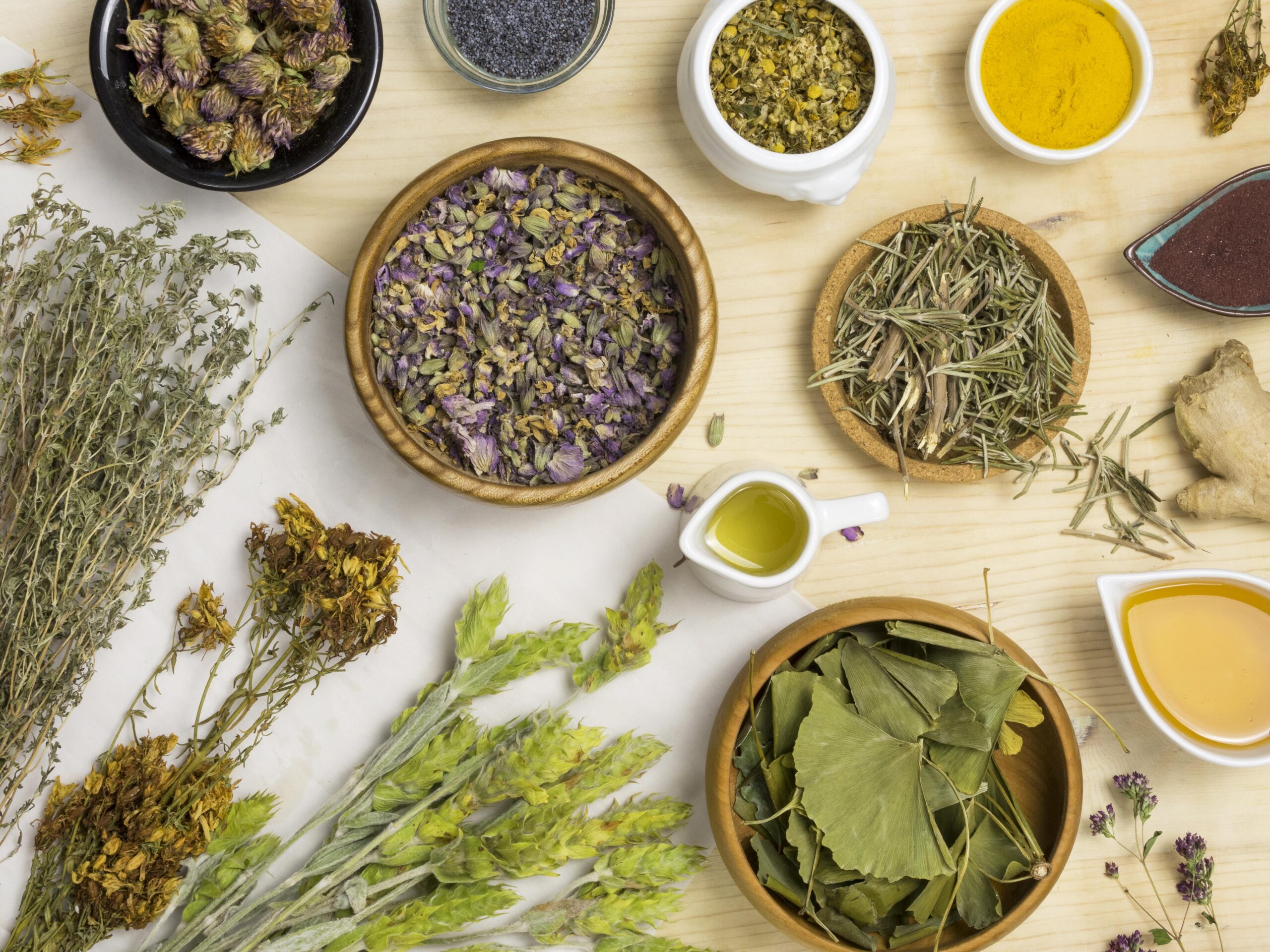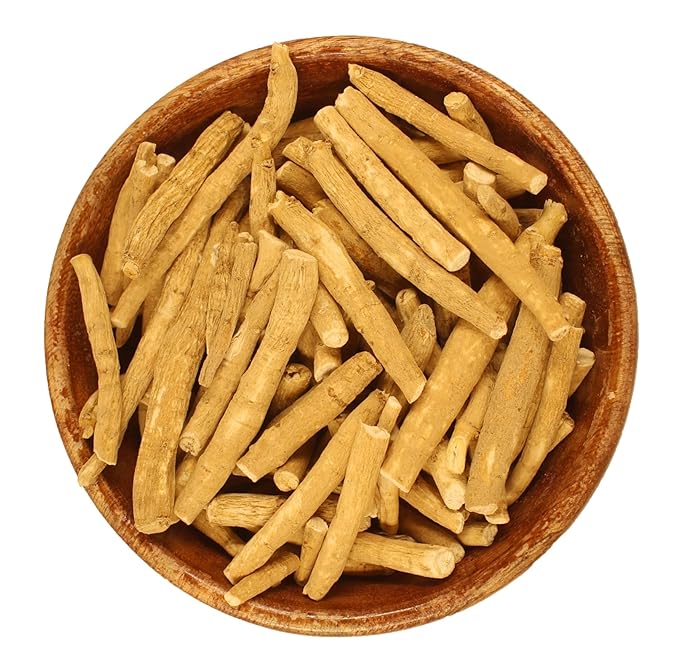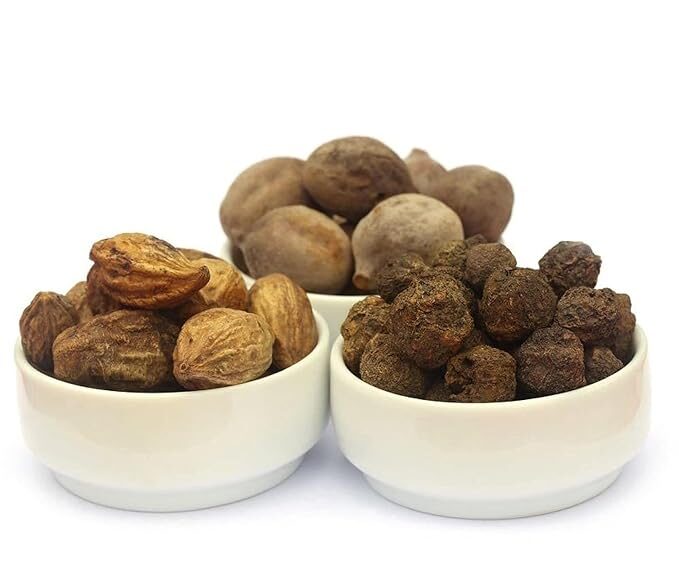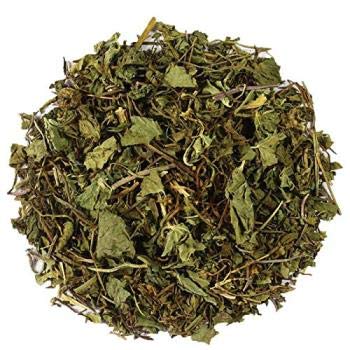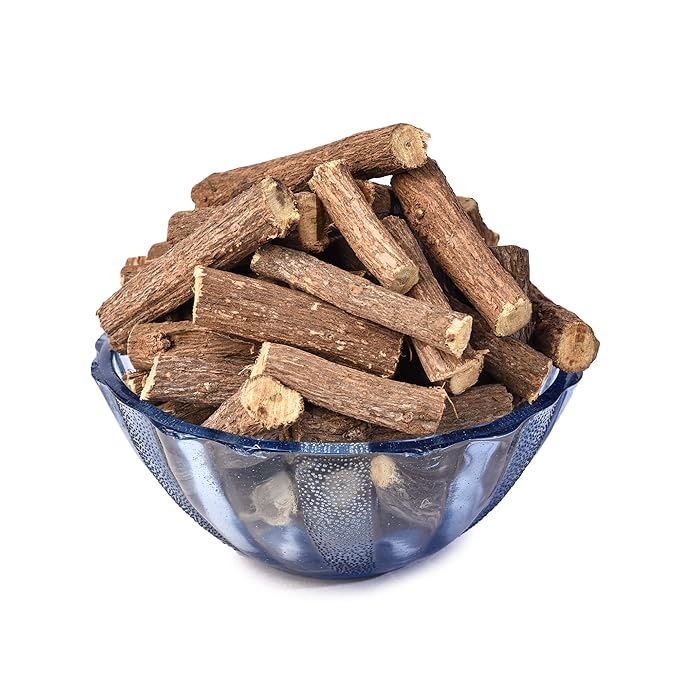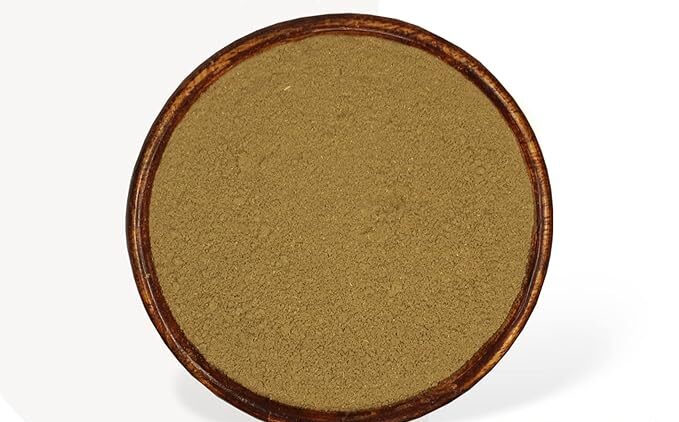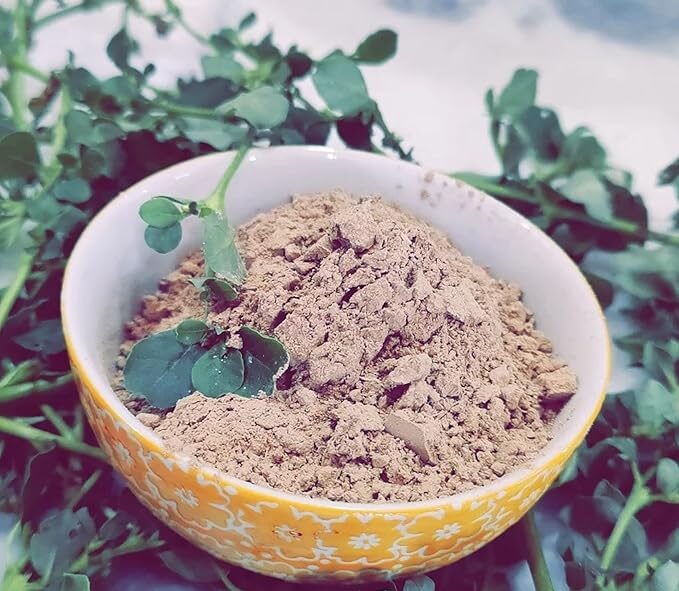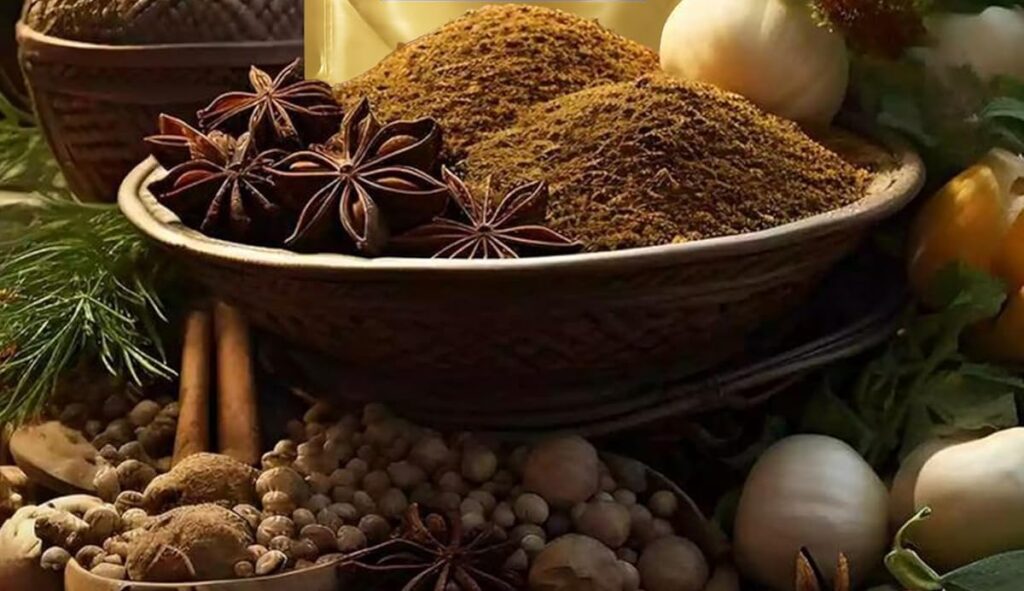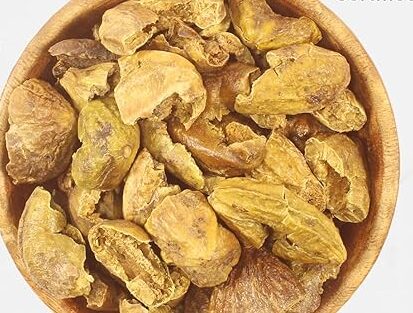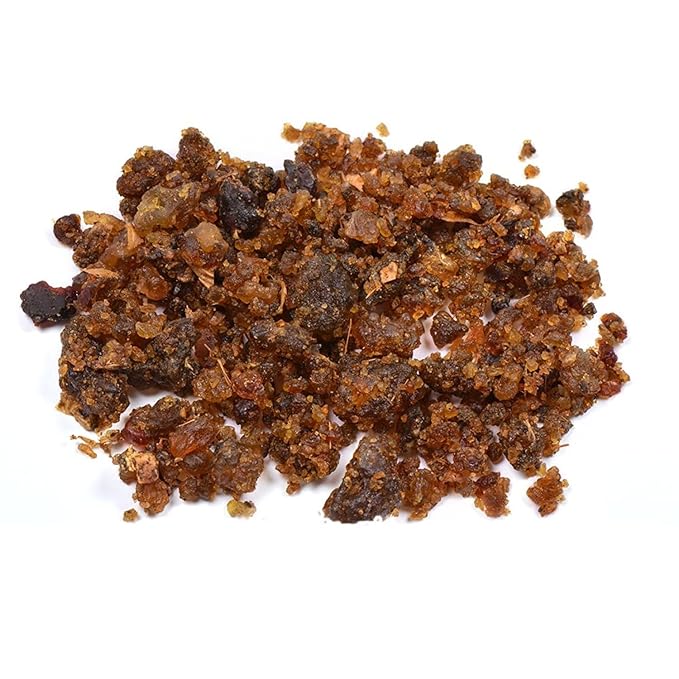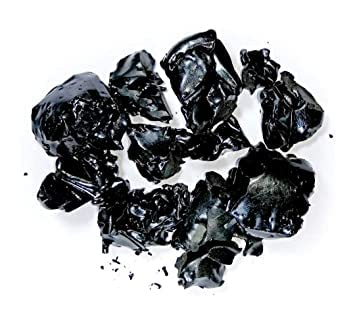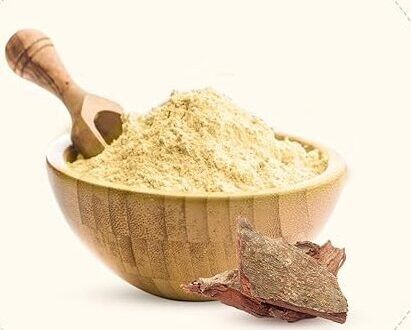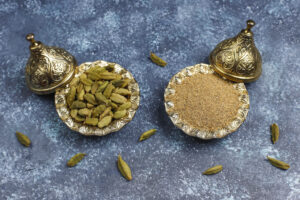Did you know Ayurvedic healers relied on simple herbs for everyday health for thousands of years? Ayurveda — India’s ancient system of natural healing — used plants to calm the mind, ease digestion, and boost immunity. You can start using these herbs easily — they’re simple and beginner-friendly. All you need is a simple start — nothing complicated. Next, you’ll find 19 powerful herbs, clear uses, and quick notes so you can start safely today.
Table of Contents
Ayurvedic Doshas Explained: Vata, Pitta & Kapha
In Ayurveda, your dosha is like your body’s mind-body blueprint — it’s a mix of physical traits, mental tendencies, and energy patterns. Ayurveda teaches that three core doshas — Vata, Pitta, and Kapha — guide body and mind. Here’s a simple breakdown:
1. Vata Dosha – Air & Space Energy
Qualities: Lightness, dryness, coolness, quickness, and changeability.
Body Tendencies: This type often shows up as a slim frame, dry skin, and quick metabolism.
Mind Tendencies: They’re usually creative and learn fast
When Imbalanced: Can cause bloating, dryness, or poor sleep.
2. Pitta Dosha:
Qualities: Hot, sharp, intense, oily
Body Tendencies: Medium build, warm body, strong digestion
Mind Tendencies: Focused, driven, sharp intellect, sometimes impatient
When Imbalanced: Acid reflux, skin rashes, irritability, inflammation
3. Kapha Dosha
Earth & Water Energy Qualities: Heavy, slow, steady, cool, moist
Body tendencies: Sturdy build, smooth skin, slow metabolism
Mind tendencies: Calm, loyal, steady memory, sometimes lethargic
Signs of imbalance: May include weight gain, water retention, or low energy.
Many people are a blend of doshas, with one type usually more dominant. Ayurveda aims to balance your doshas, bringing your body and mind into perfect harmony.
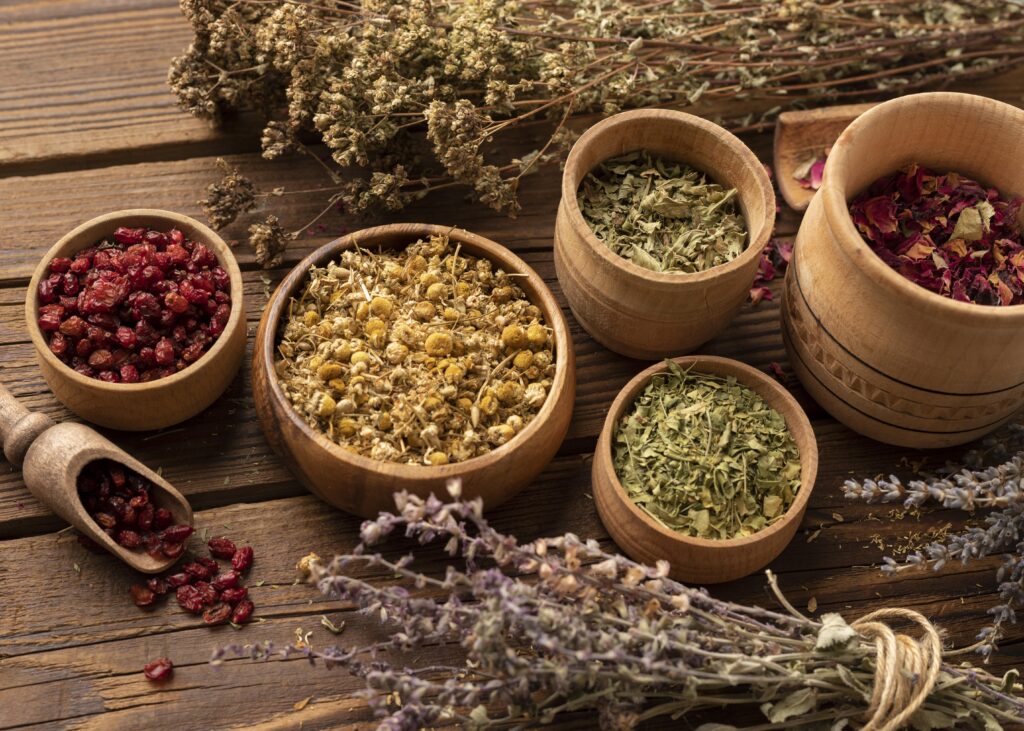
Ayurvedic Dosha chart
| Dosha | Element Combination | Main Qualities | Governs | Physical Traits | Mental/Emotional Traits | Imbalance Symptoms |
|---|---|---|---|---|---|---|
| Vata | Air + Ether | Light, Dry, Cold, Mobile | Movement, Nervous System, Circulation | Slim build, dry skin, cold hands/feet | Creative, quick thinking, adaptable | Anxiety, insomnia, constipation, dryness |
| Pitta | Fire + Water | Hot, Sharp, Intense, Oily | Digestion, Metabolism, Energy | Medium build, warm body, reddish complexion | Focused, ambitious, determined | Irritability, acidity, skin rashes, inflammation |
| Kapha | Earth + Water | Heavy, Slow, Steady, Cool | Structure, Lubrication, Immunity | Sturdy build, smooth/oily skin, thick hair | Calm, compassionate, loyal | Lethargy, weight gain, congestion, depression |
19 Powerful Ayurvedic Herbs and Their Eye-Opening Best Uses
1. Ashwagandha — The Ayurvedic Stress Shield
Ashwagandha helps you handle stress without turning you into a couch potato. Also, it supports sleep and steady energy.
Best uses:
- Mix between ½ and 1 teaspoon of ashwagandha powder into warm milk at night to encourage deep relaxation and rejuvenating sleep.
- Try a daily capsule if you prefer precise dosing.
Why it works:
Ashwagandha works as an adaptogen, supporting healthy cortisol levels and stress balance. When stress hormones are balanced, both your sleep and mood usually feel better.
2. Tulsi (Holy Basil) — The Ayurvedic Sacred Healer
Tulsi makes a great daily tea. It tastes pleasant and calms your nerves.
Best uses:
- Brew fresh or dried tulsi leaves into tea twice a day for daily wellness.
- If your throat feels scratchy, chewing a fresh leaf can bring quick relief.
Why it works:
Tulsi contains antioxidants and mild anti-inflammatory compounds. It works to support lung health and enhance your body’s natural defenses.
3. Turmeric — The Ayurvedic Golden Protector
Turmeric brightens food and eases daily aches. Plus, it mixes well into soups and smoothies.
Best uses:
- Sprinkle half a teaspoon of turmeric into meals or blend it into smoothies.
- Stir a pinch into warm milk with black pepper to help your body absorb it better.
Why it works:
Curcumin, the key compound in turmeric, naturally helps fight inflammation. As a result, it benefits joint function and nurtures brain health.
4. Triphala — The Ayurvedic Gentle Cleanser
Triphala is gentle and balances digestion without shock. Use it briefly to give yourself a refreshing reset.
Best uses:
- Mix roughly ½ teaspoon of Triphala into warm water and enjoy it at night before sleep on several evenings each week.
- Use it as a seasonal cleanse, not daily long-term.
Why it works:
Made from three nourishing fruits, Triphala supports easy digestion and healthy regularity. Because it nourishes the gut, digestion feels lighter.
5. Brahmi — The Ayurvedic Mind Tonic
Brahmi helps you focus without caffeine rush. So, it’s a calm way to sharpen memory.
Best uses:
- Begin your day with Brahmi powder mixed with honey for a gentle, wholesome boost.
- Apply Brahmi oil gently to your scalp, letting the massage ease stress, soothe the mind, and support healthy hair roots.
Why it works:
Brahmi supports brain signaling and calms anxious thoughts. Thus, focus and retention can improve.
6. Neem — The Ayurvedic Skin Purifier
For generations, Neem has been cherished for promoting radiant skin and a healthy, nourished scalp. Still, use it gently and test first.
Best uses:
- Apply fresh neem paste directly to breakouts for targeted, purifying skin care.
- Try neem oil diluted for scalp irritations.
Why it works:
Neem contains antibacterial and antifungal compounds. Therefore, it clears microbes without harsh chemicals.
7. Shatavari — The Ayurvedic Nourisher
Shatavari is especially valued in women’s wellness. It is cooling and nourishing, especially during hormonal changes. It supports long-term balance.
Best uses:
- Blend half to one teaspoon of Shatavari powder into warm milk for gentle nourishment.
- Take capsules during stressful cycles or postpartum recovery.
Why it works:
Shatavari contains natural compounds that support body strength and hormonal harmony. Because it acts gently, many women find it soothing.
8. Licorice Root — The Ayurvedic Sweet Soother
Licorice soothes the throat and calms digestion. If you have high blood pressure, limit how often you use it.
Best uses:
- Sip on soothing licorice tea to calm coughs and bring relief to a sore throat.
- Take it short-term to help ease gastritis or heartburn.
Why it works:
Licorice coats mucous membranes and reduces irritation. As a result, coughing and acidity can lessen.
9. Guduchi (Giloy) — The Ayurvedic Immunity Booster
For generations, Guduchi has been valued for strengthening immunity and enhancing resilience. Also, it blends nicely with tulsi.
Best uses:
- Boil fresh stems, then sip the decoction as a daily tonic.
- Try adding tulsi or honey to give your drink a warm, tasty touch.
Why it works:
Guduchi boosts immunity and helps your body smoothly adjust through the seasons. Therefore, you feel steadier during changes.
10. Fenugreek — The Ayurvedic Energy Enhancer
Fenugreek helps blood sugar control and digestion. It also gives food a mild nutty richness.
Best uses:
- Leave fenugreek seeds to soak overnight, then drink the infused water when you wake up.
- Add seeds or powder to dals and curries.
Why it works:
Fenugreek’s fiber and natural compounds help maintain stable blood sugar, avoiding sudden hunger and fatigue. Together, they help balance your appetite and keep your energy steady all day long.
11. Punarnava – Kidney & Fluid Balance
- This supports a healthy urinary system and reduces water buildup
- Best for Kapha imbalance
- Important: Do not use during pregnancy
12. Bhringraj – Hair & Liver Support
- Known as “King of Hair” in Ayurveda, also supports liver detox
- Pitta and Kapha balance
- Caution: Excess may lower blood pressure
13. Shankhpushpi – Brain & Nerve Nourisher
- Enhances memory, focus, and calmness
- Pitta and Vata friendly
- Caution: Avoid in very low blood pressure
14. Bibhitaki – Respiratory & Eye Health
- Clears mucus, supports vision, and detoxifies
- Kapha-balancing
- Caution: Can be drying for Vata
15. Haritaki – Longevity Fruit
- Supports detox, bowel health, and mind clarity
- Great for Vata and Kapha
- Caution: Not for pregnancy
16. Guggul – Ayurvedic Metabolism Booster
- The resin of Commiphora mukul helps promote weight balance and supports natural detox
- Balances Kapha and Vata sluggishness
- Caution: Avoid in hyperthyroid without medical guidance
17. Shilajit – Ayurvedic Energy Resin
18. Ayurvedic Arjuna – Heart & Circulation Support
- Bark extract strengthens heart muscles and supports healthy cholesterol
- Balances Kapha and Pitta
- Caution: If on heart medication, consult a doctor
19. Manjistha – Blood & Skin Purifier
- Cooling herb for liver health, skin clarity, and lymph support
- Best for Pitta imbalance (heat, rashes, inflammation)
- Caution: Not recommended for use during pregnancy.
- energy follow a steadier pattern.
Safe Ways to Use Ayurvedic Remedies
Start small and watch how your body reacts. If you take medication, check with a clinician first.
When to avoid herbs
- Steer clear of certain herbs in pregnancy unless your doctor advises otherwise.
- Stop or lower doses if you notice side effects.
Also, keep doses moderate. Long-term high doses can cause issues; so rotate herbs and use them sensibly.
Also Read : Powerful Nutrition Habits
Easy Daily Rituals with Herbs
Focus on simple, lasting habits instead of trying to change everything at once. Add some turmeric to your lunch, and sip tulsi tea during the afternoon for calm.
- Morning: Start with warm water and Triphala to gently support digestion.
- Afternoon: Tulsi tea to steady the mind.
- Night: Sip warm Ashwagandha milk to relax and unwind.
These rituals add up. Over weeks, you’ll likely notice real shifts in energy and mood.
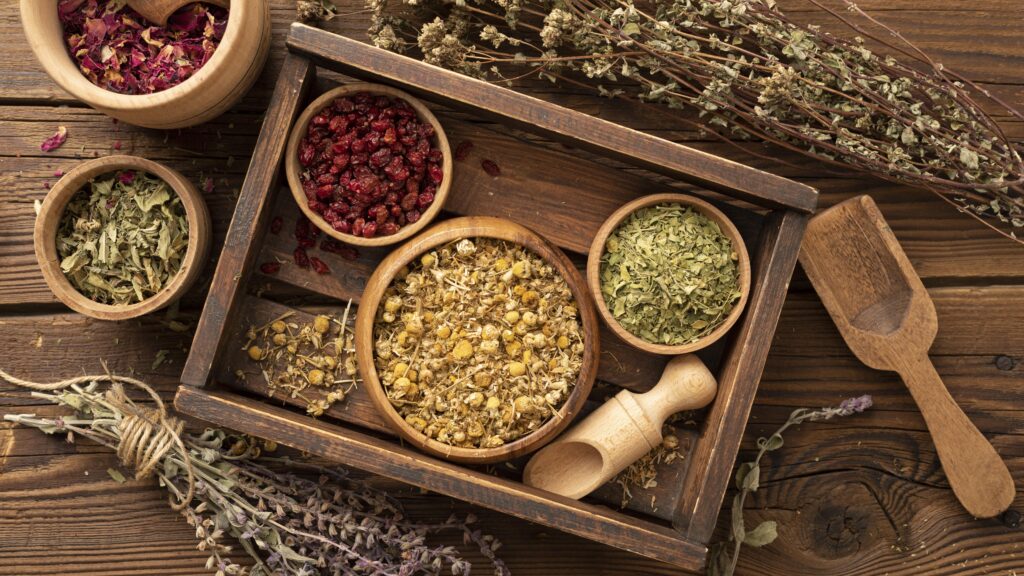
FAQs About These Herbs
Can I combine these herbs safely?
Yes. Many herbs work well together, but begin with one or two. Track how you feel.
How long before I see changes?
Some herbs act fast, like tulsi for a sore throat. Others, like ashwagandha, need weeks.
Are there side effects?
Most herbs are safe in moderation. Still, watch for reactions and check with a professional if needed.
Do I need expensive supplements?
Takeaway
Try one small change this week. Also, choose one herb that fits your main need — sleep, digestion, or immunity — and use it for two to four weeks. Then, adjust based on how you feel. These Ayurvedic herbs are practical, time-tested allies. With simple care, they can add balance, calm, and steady energy to your daily life.
Also Read : 14 Foods You Should Never Refrigerate

